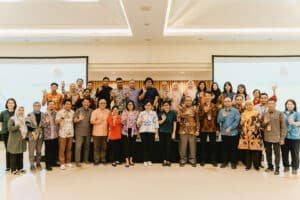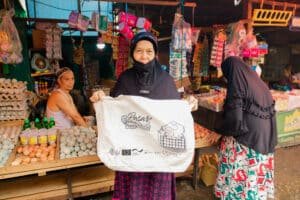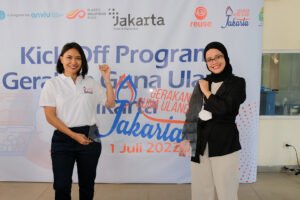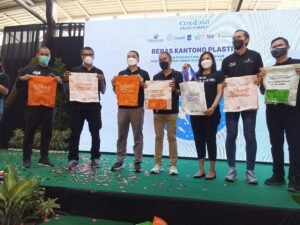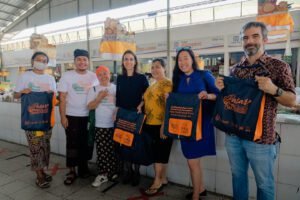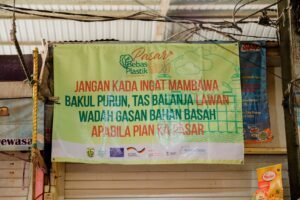The Bogor City Government has issued Bogor Mayor Regulation Number 61 of 2018 concerning Reducing Plastic Use. Since the enactment of this regulation, the City of Bogor has succeeded in reducing the transportation of plastic waste sent to the Galuga TPA by up to 41 tons per month. However, unfortunately, traditional markets are not yet one of the subjects included in this regulation. Traditional markets are a source of single-use plastics in Bogor City because conventional markets are still the people of Bogor City’s choice to carry out their daily shopping activities. Based on this, the Indonesian Plastic Bag Diet Movement (GIDKP), together with the Bogor City Environmental Service and Perumda Pasar Pakuan Jaya Bogor City, collaborated to implement a Plastic Free Market experimental program and make Pasar Baru Bogor, the first Plastic Free pilot market in Bogor City.
The Plastic Free Market Program began with baseline research activities with traders and Focus Group Discussions (FGD) with local community representatives in Bogor City. This activity was carried out to find out the consumption figures for single-use plastics used by market traders, as well as to find out what alternative ideas and solutions need to be implemented so that reducing single-use plastic consumption in traditional markets can be achieved.

Baseline research was conducted on 14-21 December 2020. Based on the results of baseline research conducted by GIDKP at Pasar Baru Bogor for traders, the plastics most commonly used are large and small plastic bags. In one day, Pasar Baru Bogor can produce as many as 6,318 large plastic bags and 11,490 small plastic bags. Furthermore, of the 353 respondents, 68% of traders were willing to reduce the use of plastic for selling. They agree because it can reduce spending on purchasing plastic bags. On average, one trader can spend Rp. 80,000 to Rp. Three hundred thousand per month to buy plastic bags. However, most wet commodity traders, such as meat, chicken, and fish, still need to be ready to reduce the consumption of plastic bags in their stalls. Most traders also understand that plastic is dangerous for humans and the environment. According to traders, consumers who bring shopping bags are still infrequent; they can even be counted on their fingers. It’s possible that consumers forget, are lazy, or want to be practical.

The same thing was conveyed by FGD participants from various communities, namely that it is still difficult to change people’s mindsets. So, there needs to be support from all parties, from government agencies, traders, consumers, and regional roles to collaborate. It is hoped that the government can issue clear rules, rewards, and punishments for the parties involved. Rewards can be given to traders who start providing/selling reusable bags at their kiosks or consumers who bring reusable bags when shopping. Education and outreach activities can continue to be carried out sustainably, and a reduction in plastic consumption in traditional markets can be achieved so that the Plastic Free Market program can be replicated in other traditional markets in Bogor City.

